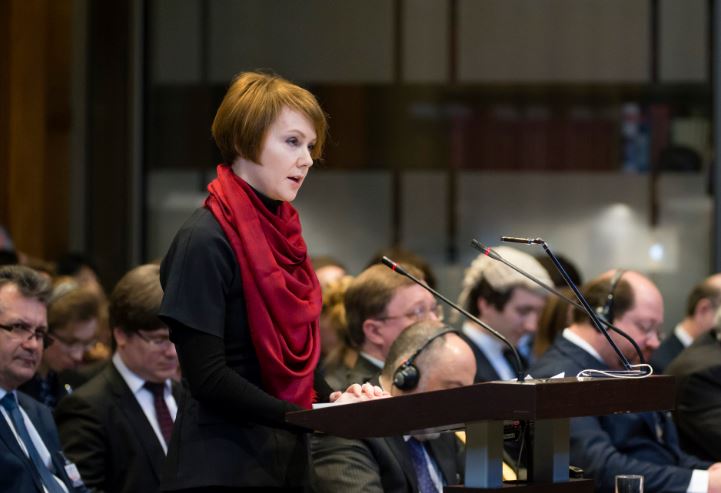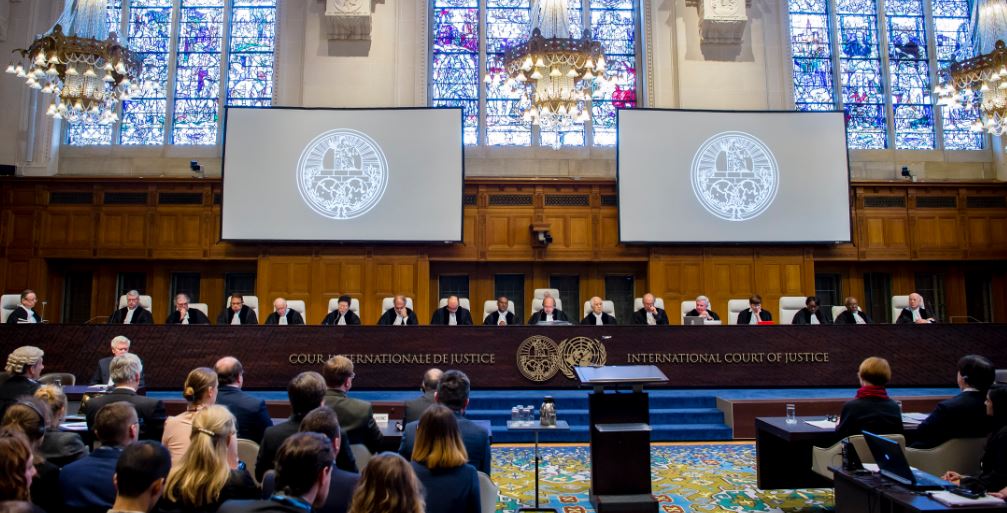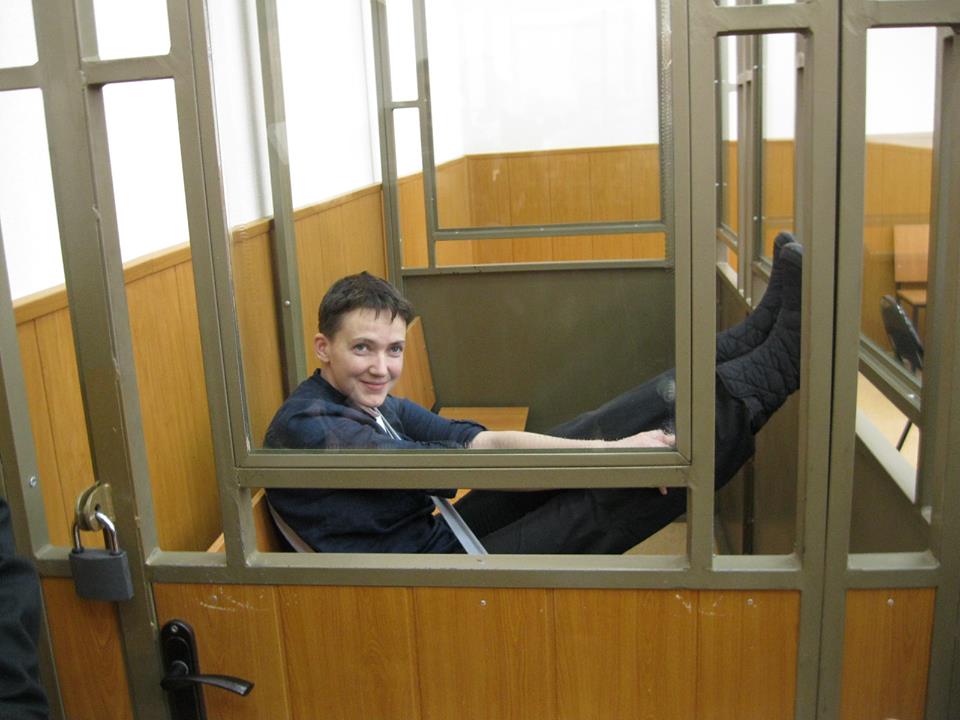On 6 March 2017, the International Court of Justice, the principal judicial organ of the UN, started holding hearings in Ukraine’s case against Russia concerning the Application of the International Convention for the Suppression of the Financing of Terrorism and of the International Convention on the Elimination of All Forms of Racial Discrimination at the Peace Palace in The Hague.
Ukraine has asked for provisional measures to be applied to Russia. Particularly, Ukraine seeks relief for Russia’s continuous violations of these two treaties. Russia is due to answer tomorrow, 7 March 2017. If the Court agrees that there is a case to answer, examining the evidence could take several years. In order to provide relief to civilians from aggression of the Russian-backed armed groups in Donbas and repressions in Crimea, Ukraine has asked for provisional measures to be applied immediately.
Read also: Full text of Ukraine’s case against Russia in UN court
In this introductory statement, deputy Minister of Foreign Affairs Olena Zerkal outlined Ukraine’s claims against Russia.

Mr. President, distinguished Members of this honorable Court. It is a great honor and exceptional privilege to appear before the principal judicial body of the United Nations on behalf of Ukraine.
Ukraine has come before this Court to defend the basic human rights of its people, faced with the Russian Federation’s violations of international law. Today, I ask the Court to indicate provisional measures to prevent those rights from being irreparably harmed while this case is pending.
Thousands of innocent Ukrainian civilians have already suffered deadly attacks, and millions remain under imminent threat. Their peaceful and simple day-to-day routines have been ruined, and their fundamental rights have been blatantly violated by one of the permanent members of the United Nations Security Council – the Russian Federation.
The Russian Federation continuously violates international law and abuses human rights. The Russian Federation continues to supply deadly assistance to illegal armed groups in Ukraine that have committed numerous terrorist attacks. In occupied Crimea, the Russian Federation wholly disregards human rights, while implementing policies of cultural erasure and pervasive discrimination. These actions are unacceptable to the international community: They have been denounced by the United Nations.
The Russian Federation’s tactics include support for terrorism and acts of racial discrimination, as well as propaganda, subversion, intimidation, political corruption, and cyber-attacks. This is the reality that we are facing in Ukraine. The Russian Federation has continued to engage in this conduct for three years, and all this time it continues to deny its multifaceted aggression against Ukraine.
Today, I stand before the World Court to request protection of the basic human rights of the Ukrainian people. We seek justice and accountability under international law, while the Russian Federation continues to demonstrate disregard for its obligations under international treaties. As a result, the people of Ukraine are facing an ongoing campaign of terror and cultural erasure. The situation is truly dire.
Even in the last few weeks, the stakes have been raised. Russian-backed armed groups have again escalated their attacks and intimidation of civilians. In the Ukrainian city of Avdiivka, just within the week between 29 January and 5 February 2017, independent OSCE monitors have confirmed at least 8 deaths and 30 injuries among civilians. As a result of indiscriminate shelling, the city has suffered widespread destruction of residential buildings and critical infrastructure, leaving civilians without electricity, water supplies, and even heat at harsh temperatures far below zero.
Read more: Escalation in Avdiivka, Eastern Ukraine: key facts and sources
In just two months, since the beginning of 2017, the amount of ammunition used to shell Avdiivka is estimated at almost 15,000 pieces. This amount is equivalent to 14 cargo railway cars fully stocked with ammunition. Meanwhile, the official spokesperson of the Russian president publicly expressed hope that Russian proxies will not run short of ammunition. Can there be any doubt about where all this ammunition comes from? No. It is from the Russian Federation.
The attacks on Ukrainian civilians are the logical conclusion of the Russian Federation’s support for groups that engage in terrorism. The destruction of Flight MH17 with a Russian Buk system did not stop Russian financing of terrorism. With that continued support, we suffered an attack on a bus at Volnovakha. A mere two weeks later, Mariupol was bombarded, and Kramatorsk a few weeks after that. In Kharkiv, a peaceful population was terrified by a string of bombings. These were not isolated incidents, but the result of Russia’s sponsorship of terrorism.
Just recently, eleven Crimean Tatars who were peacefully protesting against arbitrary searches were forcefully detained. This is yet another example of how the Russian regime silences those it disfavors.
In this case, Ukraine seeks relief for Russia’s continuous violations of two treaties: the International Convention for the Suppression of the Financing of Terrorism, and the International Convention on the Elimination of All Forms of Racial Discrimination. Ukraine’s counsel will explain in detail the nature of our claims, and the reasons why provisional measures are so urgent. Before they do so, I wish to briefly provide historical context to show that current events in Ukraine are not occurring in isolation.
Since the re-establishment of modern Ukraine’s statehood after the collapse of the Soviet Union, the people of Ukraine have sought to embrace democratic values, placing human life and dignity as the highest priority of both the government and society.
Unlike many other post-communist states, Ukraine has never been known for ethnic tensions. The Constitution of Ukraine and relevant legislation provides a fundamental system of protection of ethnic groups’ rights, as verified by UN and EU monitors. Horrifying news of terror against civilians seemed to be something that was happening far away from us.
Over the last decade Russia’s interference in Ukrainian affairs has steadily escalated. It reached dangerous new levels in 2014.
- Russia decided to intervene in Ukraine militarily;
- sponsor illegal groups that commit acts of terrorism on Ukrainian soil;
- and violate the human rights of millions of people of Ukraine.
Including, for too many, their right to life. This conduct reflects a broader pattern of Russian behavior that sadly we are all familiar with.
As Deputy Foreign Minister, I have dealt with all of these issues. But today I am here as Ukraine’s Agent, and in that capacity, my interest is in the law, not politics. For almost three years, I have personally pursued negotiations with the Russian Federation on these legal disputes. I admit that it has been very difficult. Time after time, Russia brushed aside Ukraine’s protests of treaty violations. Our objections were not taken seriously, and we were repeatedly told that we did not have a real dispute. Then I would return home and see with my own eyes Russia continuing its campaign against the Ukrainian people. After many efforts, it was finally time to say that enough is enough.
That is what finally brings us here to the World Court. At this trying time, we must place our faith in the institutions of international law for protection. This case will send a message about whether the international legal order can stand up to powerful countries that disregard the law and disrespect human rights.
At the same time, our request today is very modest. All we seek is a measure of stability and calm, in an unpredictable and dangerous situation.
Mr. President, Members of the Court, in light of the imminent threat facing the people of Ukraine, I urge you to order provisional measures. Ukraine’s distinguished counsel will explain the reasons why the Court should grant us this protection.
First, Professor Harold Hongju Koh will provide an overview of Ukraine’s claims and our request for provisional measures.
Second, Ms. Marney Cheek will explain the need for provisional measures relating to the Terrorism Financing Convention, and will demonstrate that all criteria for the indication of provisional measures are satisfied.
Third, Mr. Jonathan Gimblett will explain the need for provisional measures relating to the CERD [Convention on the Elimination of All Forms of Racial Discrimination], and will demonstrate that the criteria for the indication of provisional measures under that Convention are also satisfied.
Thank you, Mr. President and honorable Members of the Court. I now ask you to give the floor to Professor Koh to continue the oral pleadings of Ukraine.
- Read more: Legal war: Ukraine vs. Russia in international courts
- EU court confirms Russia supplies weapons to Donbas separatists
- Punishing Russia for war crimes in Ukraine is possible, but will take time








